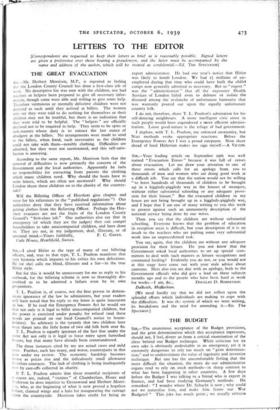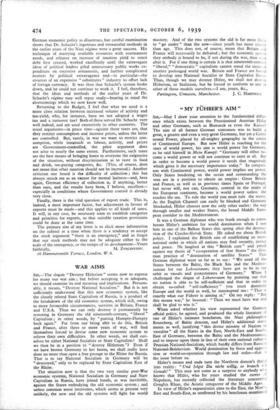THE BUDGET Sm,—The unanimous acceptance of the Budget provisions, and
the grim determination which this acceptance represents, should not, I feel, divert us from a critical examination of the ideas behind our Budget technique. While criticism for its own sake is obviously undesirable in an emergency, yet it is extremely dangerous to rely too much on " grim determina- tion," and to underestimate the value of ingenuity and inventive technique. But one has the uncomfortable feeling that the more difficult the situation, the more do our administrative organs tend to rely on stock methods—in sharp contrast to what has been happening in other countries. A few days before the Budget I was talking to a friend who is expert in finance, and had been studying Germany's methods. He remarked : " I wonder where Dr. Schacht is now ; why could not we naturalise him, and make him frame our War Budgets? " This joke has much point ; we usually criticise
German economic policy as disastrous, but careful examination shows that Dr. Schacht's ingenious and resourceful methods in the earlier years of the Nazi regime were a great success. His technique of marrying available resources with rearmament needs, and reliance on increase of taxation yield to remit debt first created, worked excellently until the extravagant ideas of political leaders piled unnecessary public works ex- penditure on excessive armaments, and further complicated matters by political extravagance and—in particular—the creation of an expensive " substitutes " industry to offset lack of foreign currency. It was then that Schacht's system broke down, and he could not continue to work it. I feel, therefore, that the ideas and methods of the earlier years of Dr. Schacht's regime may well repay study—bearing in mind the shortcomings which we now know well.
Returning to the Budget, I feel that what we need is a more close relation between increased volume of activity and tax-yield; why, for instance, have we not adopted a wages tax and a turnover tax? Both of these served Dr. Schacht very well indeed, and are used extensively in other countries. The usual arguments—in peace time—against these taxes are, that they restrict consumption and increase prices, unless the latter are controlled. But, surely, in war we want to restrict con- sumption, while inasmuch as labour, activity, and prices are Government-controlled, the price argument does not arise to nearly the same extent. Furthermore, such taxes are the best means of bringing home to everyone the exigencies of the situation, without discrimination as to taste in food and drink, tax-paying categories, &c. (This, of course, does not mean that other taxation should not be increased.) Another criticism one heard is the difficulty of collection ; this has always struck me as an excuse for mental laziness—and, here again, German efficiency of collection is, if anything, better than ours, and the results have been, I believe, excellent— especially in conditions where Government control is already very close.
Finally, there is the vital question of export trade. This is, indeed, a most important factor, but adjustment in favour of exports must be made—and this applies to all kinds of taxes. It will, in any case, be necessary soon to establish categories and priorities for exports, so that suitable taxation provisions could be done at the same time.
The primary aim of my letter is to elicit more information on the subject at a time when there is a tendency to accept the stock argument " there is an emergency," and to forget that our stock methods may not be adequate either to the scale of the emergency, or the tempo of its development—Yours



































 Previous page
Previous page